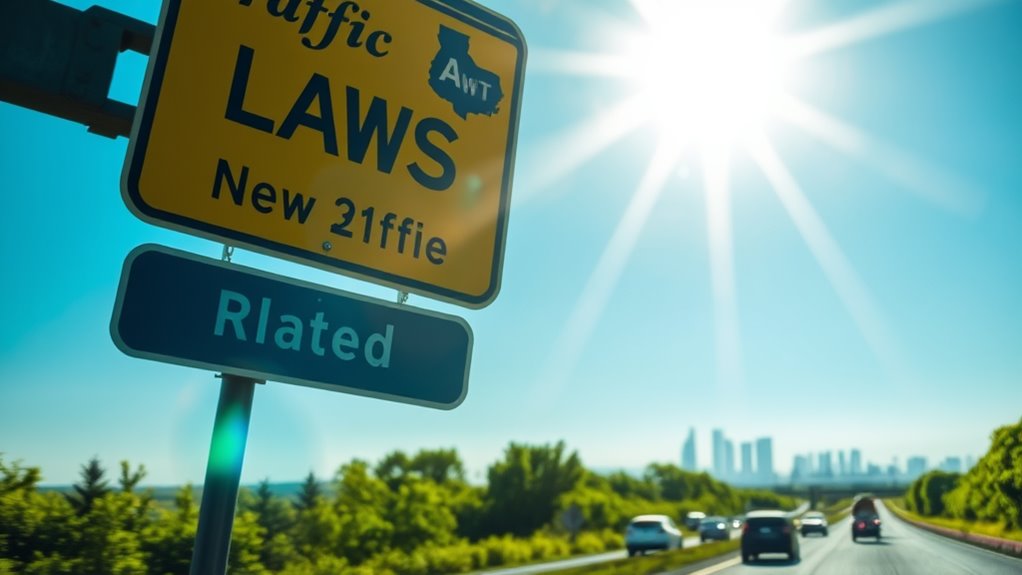
Maneuvering the ever-changing landscape of traffic laws can feel like walking a tightrope. Recent legislation, particularly in Washington D.C. with the STEER Act, is making it clear that out-of-state drivers aren't exempt from accountability. With over 800,000 citations issued in just one year, the implications for non-residents are significant. Understanding these changes is essential, as the stakes have never been higher. How will this affect your next trip?
As out-of-state drivers hit the roads, recent changes in traffic laws across various states are reshaping accountability and enforcement. One significant development comes from Washington D.C., where the STEER Act empowers the D.C. Attorney General's Office to sue out-of-state drivers for unpaid traffic fines in local courts. This law aims to guarantee that out-of-state violators are held accountable for their actions, paving the way for enforcement of judgments even in other states.
By 2023, D.C. issued 808,933 citations to vehicles with out-of-state plates, accumulating a staggering $160.7 million in unpaid fines, primarily targeting drivers from Maryland and Virginia. Such measures not only bolster local revenue but also serve as a deterrent for reckless driving behavior. The STEER Act emphasizes the need for accountability for dangerous drivers, which has been echoed by local residents expressing concerns about road safety. This trend underscores the importance of hiring a traffic attorney when facing legal challenges.
In California, the introduction of speed control cameras along the Pacific Coast Highway marks another shift in enforcement aimed at curbing dangerous driving. These cameras impose fines ranging from $50 to $500 for speeding, with the most severe penalties reserved for speeds exceeding 100 mph over the limit. Targeting high-risk areas like school zones, this strategy reinforces the state's commitment to reducing traffic accidents through strict speed enforcement.
With increasing fines for serious infractions, California's approach signals a broader trend toward heightened accountability for drivers, including those from out of state.
New York has also revised its point system for traffic violations, imposing stricter penalties for repeat offenders. Colorado's recent introduction of fines for weaving in and out of express lanes, starting at $75, is part of a broader initiative to enhance safety on the roads. Additionally, California mandates that drivers change lanes safely when passing bicyclists, while the Omnibike Bill prohibits enforcing bicycle licensing laws.
These regulations collectively aim to mitigate risks associated with reckless driving and improve overall road safety.
Safety and accountability are further emphasized through Colorado's hands-free driving law, which bans the use of handheld phones while driving. This law, along with stricter penalties for dangerous behaviors, underscores a commitment to safer road practices. Colorado's updated car seat law, requiring children to remain in car seats until they reach nine years old and weigh at least 40 pounds, exemplifies efforts to enhance child safety in vehicles.
Educational campaigns are also vital in promoting responsible driving, reflecting a thorough approach to road safety.
Moreover, California's requirement for vehicles to incorporate advanced driver assistance systems (ADAS) represents a significant leap in vehicle safety standards. Features such as automatic emergency braking aim to reduce accidents and improve driving conditions. These measures are coupled with stringent emission standards, reflecting a dual focus on safety and environmental concerns.
Finally, California's AB 2773 mandates transparency during traffic stops, requiring officers to disclose the reasons for the stop before questioning drivers. This law enhances accountability in police interactions, guaranteeing that traffic enforcement practices are documented and monitored.
As states adopt these new laws, out-of-state drivers will find themselves under increasing scrutiny, reinforcing the importance of awareness and compliance while traversing unfamiliar roads.
Conclusion
As the landscape of traffic laws evolves, out-of-state drivers find themselves maneuvering a minefield of new regulations. With initiatives like D.C.'s STEER Act and Colorado's tightening grip on road safety, the stakes have never been higher. Ignoring these changes could lead to hefty fines that linger like shadows on your driving record. Stay informed and drive responsibly, for in this ever-shifting terrain, awareness is your best ally against unforeseen penalties.


